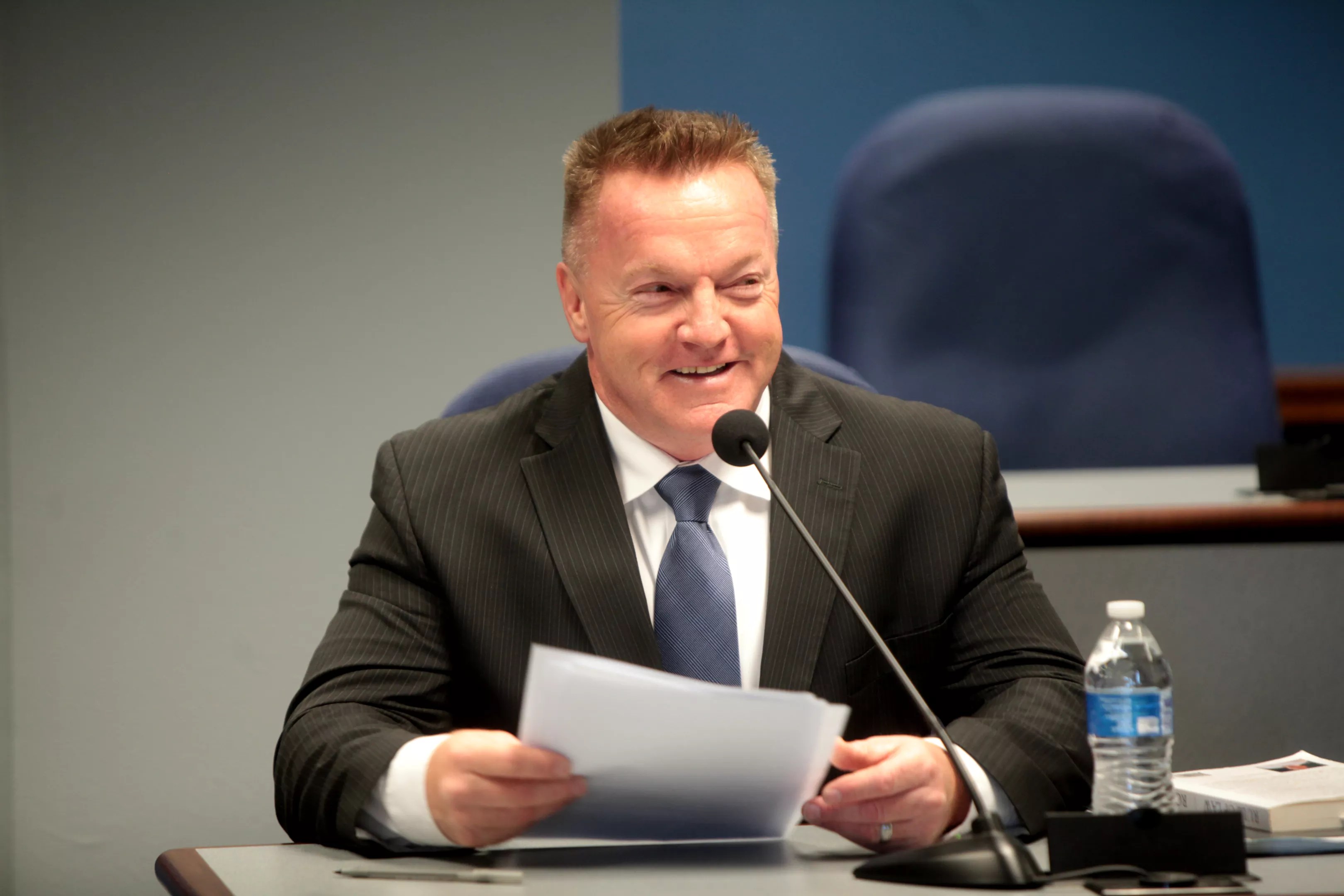
Gage Skidmore/Flickr

Audio By Carbonatix
Former Arizona lawmaker and current state senate candidate Anthony Kern wants you to think Facebook founder Mark Zuckerberg gave millions to Katie Hobbs during the 2020 election.
Except, Zuckerberg did not.
“Maricopa County Supervisors and Katie Hobbs took $3 million each from Zuckerberg during the 2020 election,” Kern tweeted on Monday. “Why?”
The misleading tweet had racked up nearly 6,000 likes and hundreds of outraged comments by the afternoon.
But Kern – a staunch believer in November 2020 presidential election conspiracies who used campaign funds to travel to the January 6 riots – did not offer any more information.
Kern did not return a phone call or email from Phoenix New Times seeking comment.
But it’s clear that Kern’s insinuations of misconduct about the November 2020 election are unfounded.
“Unequivocally, no,” said Murphy Hebert, communications director at the Arizona Secretary of State. “We did not receive $3 million dollars from Mark Zuckerberg.”
Hobbs was elected as secretary of state for Arizona in 2019. During her fundraising campaign, she raised $1.1 million in donations, the largest of which came from Planned Parenthood and several trade unions. So far in her ongoing campaign for governor, she has raised nearly $3 million, largely from individual contributions. Zuckerberg is not a donor to Hobbs.
Hebert declined to speculate on Kern’s claims.
Kern repeated his false claims during Donald Trump’s “Save America” Rally in Florence, Arizona just a few weeks ago.
“We’re going to keep Arizona red,” Kern said during the rally. “It’s going to be a red wave that will blow the mind of every American out there. I want to thank Donald Trump, who I believe is our president because the election was stolen.”
It’s possible that Kern’s recent tweet refers to the $4.8 million grant that the Center for Election Innovation and Research gave to the state of Arizona to help run an educational campaign in advance of the 2020 election.
CEIR is a Washington D.C.-based nonprofit that works to improve voter turnout and election policy. The organization, which was founded in 2016, accepted a $50 million donation from Zuckerberg and used the money to offer grants to states to help fund election outreach. Arizona and 23 other states received funding.

Anthony Kern asked his followers a rhetorical question on the campaign trail for another government office.
In Arizona, Hebert said, the money was used “to put together an information campaign… to communicate directly with voters about some of the changing landscape around the elections.”
She credited the “historic participation” in the 2020 election in part to those resources.
“These grants were offered to every single state, both red states, blue states, everything in between,” said David Becker, executive director and founder of CEIR.
States chose what to spend the money on, Becker said. Some created mailers, others did radio advertising, informing voters how and where they could vote.
“It’s never ‘plan A’ to have philanthropy fund a service that government should be paying for,” he added, but noted that faced with the challenges posed by the pandemic, federal and state government “failed to step up.”
Zuckerberg also gave a series of generous donations in the fall of 2020 to the Center for Tech and Civic Life. The organization used the fund to create a “COVID-19 response” grant program which, it said, “offered funding to local election administrators to enable them to provide safe and secure voting procedures during the pandemic.”
The Center for Tech and Civic Life was named in a lawsuit filed in December 2020 by Arizona GOP chairwoman Kelli Ward, which alleged a litany of claims about election fraud that the county ultimately debunked. The case went nowhere and the judge dismissed it.
But, in court filings, CTCL defended itself against claims that it was “a disguise for an insidious partisan scheme,” saying that the funds were used for “purchase personal protective equipment for voters and election workers, to recruit and train additional staff, to provide improved security, to establish in-person polling places,” and other normal election procedures.
The founder of Facebook might not have personally cut checks to Hobbs and Maricopa County. But now, private funding is banned in Arizona anyway.
In April 2021, Governor Doug Ducey signed a bill that would bar the use of private funds to fund elections. It would apply only to “preparing for, administering or conducting an election,” including the voter registration process – and would not apply to, say, ballot reviews.
Although the bill was a response to the mounting outrage over claims of “election fraud” in 2020, its authors said, the use of private money for elections has raised eyebrows on both sides of the aisle in Arizona.
“We all came to an agreement that it is the duty of taxpayers to fund the election,” Arizona Representative Kelli Butler told NPR last March. “But the fact is, we aren’t doing that right now.”
Butler is a Democrat who represents Arizona Legislative District 28 which includes Scottsdale.
The harsh reality about the lack of funding is why organizations like the Center for Election Innovation and Research exist and donate widely, its founder said.
“That’s not a problem for me, so long as [the] government is willing to step up and say, we are going to guarantee adequate funding [for elections],” Becker said. “That would be [a] wonderful outcome.”
Instead, states are “strangling the budgets of election offices while preventing them from seeking help from other sources,” he said.
In Arizona, the secretary of state’s office requested an additional $5 million this year to help with voter outreach, in lieu of private funding. Although the budget is not yet formalized, “it’s not looking good,” Hebert said.
“It means that we won’t be able to do the same level of outreach,” she said.
But still, even without charity, the office still plans to “do everything that we can to make sure people can participate fully in their election.”